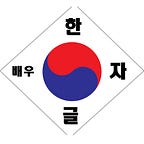In your first steps of learning Korean, I’m sure you’ve realised that there are a few pairs of vowels that sound very similar. Namely, vowels that use ㅐ and ㅔ.
Why do these vowels exist? Why isn’t there just one vowel for one sound?
Well… that’s those are the questions I’ll be answering today.
Why do these vowels exist?
To answer this question, we need to take a look at Korean in the past.
One of the early examples of ㅐ and ㅔ was in Middle Korean, a type of Korean spoken in the Joseon period (from the 1600s to the modern period).
Here, ㅐ and ㅔ were pronounced as a diphthong (a combination of two vowels in a single syllable). Since ㅐ is made up ofㅏ and ㅣ, it was pronounced ai. And ㅔ (ㅓ and ㅣ) pronounced eoi.
As time passed, these diphthongs morphed into monophthongs. “Ai” transformed into ae (ㅐ is closer to a than e). “Eoi” transformed to e (ㅔis closer to e than a).
Moving onto the mid-1900s, where the Gyeonggi dialect (dialect spoken in Seoul) starts to be more distinctive to Standard Korean. Because ㅐ and ㅔ wasn’t very distinctive, it merged and both vowels started to be pronounced as “e”
Some other notable differences in the Gyeonggi dialdct compared to Standard Korean are:
- Disappearance of different vowel length (officially there is a long vowel for every standard vowel)
- Sometimes switching ㅗ for ㅜ (삼촌 uncle, to 삼춘 etc.)
- The rise of popularity in the informal speech level
- A different informal “questioning” sentence ending- 냐?
When is ㅐ and ㅔ pronounced differently?
Nowadays, the difference in pronunciation is only noted in Standard Korean. This is the Korean used for news broadcasts and other more official events.
Sometimes, a longer official word (for example 아이 child) can be shortened to use ㅐorㅔ(애 contraction of 아이).
Will one of them die out?
There is a possibility that one will I’d the majority of the population uses only one in conversation.
This has actually happened in the past where the vowel ㆍ (pronounced as the “u” in but), which existed on Middle Korean, but now ha ms been replaced by either ㅏ or ㅓ.
Seeing that this has happened before, there definitely is a possibility for ㅐ and ㅔ to merge completely in the future.
Final Words
I hope this article was informative and interesting for you, and helped you understand what the difference between ㅐ andㅔis, and why they exist.
Until next time,
화이팅! (Korean for Good Luck!)
Luca
